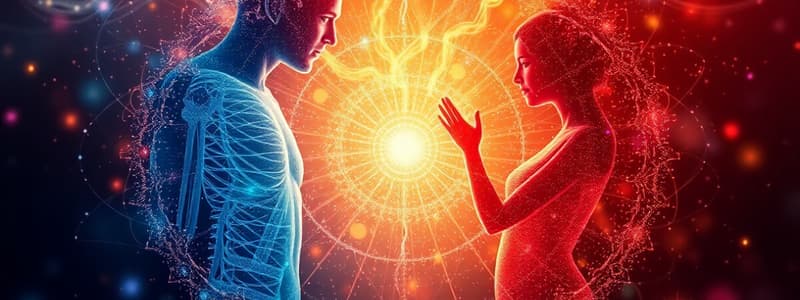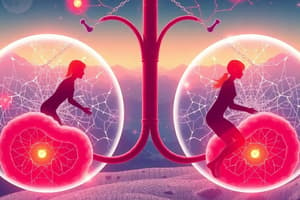Podcast
Questions and Answers
What is the role of insulin resistance in the twin cycle hypothesis related to T2DM?
What is the role of insulin resistance in the twin cycle hypothesis related to T2DM?
- It contributes to the loss of beta cell mass over time. (correct)
- It leads to immediate improvement in glucose metabolism.
- It results in increased muscle sensitivity to glucose.
- It causes direct damage to pancreatic cells.
What primarily happens in the first cycle of the twin cycle hypothesis?
What primarily happens in the first cycle of the twin cycle hypothesis?
- Insulin sensitivity increases in visceral fat.
- Normal energy storage options become saturated. (correct)
- Increased fat storage occurs in the liver.
- Skeletal muscle effectively stores excess energy.
What effect does prolonged excess caloric intake have on insulin receptors in tissues?
What effect does prolonged excess caloric intake have on insulin receptors in tissues?
- They experience decreased effectiveness in energy storage. (correct)
- They lead to increased triglyceride conversion in adipose tissue.
- They enhance nutrient clearing by muscle tissue.
- They become more sensitive to insulin over time.
What is the consequence of elevated circulating free fatty acids (FFA) due to insulin resistance?
What is the consequence of elevated circulating free fatty acids (FFA) due to insulin resistance?
Which nutrient is primarily affected by insulin resistance as per the twin cycle hypothesis?
Which nutrient is primarily affected by insulin resistance as per the twin cycle hypothesis?
In the context of T2DM, where is excess energy primarily stored when normal storage is overwhelmed?
In the context of T2DM, where is excess energy primarily stored when normal storage is overwhelmed?
What triggers the onset of the first cycle in the twin cycle hypothesis?
What triggers the onset of the first cycle in the twin cycle hypothesis?
How does leptin resistance contribute to T2DM according to the twin cycle hypothesis?
How does leptin resistance contribute to T2DM according to the twin cycle hypothesis?
What occurs in the liver during prolonged insulin resistance that exacerbates insulin resistance in hepatocytes?
What occurs in the liver during prolonged insulin resistance that exacerbates insulin resistance in hepatocytes?
How does elevated circulating free fatty acids (FFAs) specifically impacted insulin resistance?
How does elevated circulating free fatty acids (FFAs) specifically impacted insulin resistance?
In the context of T2DM, what is the result of inappropriate gluconeogenesis in the liver?
In the context of T2DM, what is the result of inappropriate gluconeogenesis in the liver?
What is the primary reason for the 'ectopic' deposition of fat in individuals with metabolic syndrome/T2DM?
What is the primary reason for the 'ectopic' deposition of fat in individuals with metabolic syndrome/T2DM?
Which statement correctly describes the pancreatic changes associated with T2DM?
Which statement correctly describes the pancreatic changes associated with T2DM?
What metabolic consequence arises from fat accumulation (steatosis) in the liver?
What metabolic consequence arises from fat accumulation (steatosis) in the liver?
What is a consequence of fatty pancreas that was initially hypothesized?
What is a consequence of fatty pancreas that was initially hypothesized?
Which fatty acid is particularly linked to accumulation in pancreatic beta-cells?
Which fatty acid is particularly linked to accumulation in pancreatic beta-cells?
What is the relationship between insulin resistance in the liver and gluconeogenesis?
What is the relationship between insulin resistance in the liver and gluconeogenesis?
What function does palmitic acid have in insulin-resistant cells?
What function does palmitic acid have in insulin-resistant cells?
What physiological change may occur in beta-cells due to excess fat and sugar according to studies?
What physiological change may occur in beta-cells due to excess fat and sugar according to studies?
What dietary intervention has been shown to improve fat deposition and fibrosis in the pancreas?
What dietary intervention has been shown to improve fat deposition and fibrosis in the pancreas?
What cellular stress is associated with fatty pancreas and beta-cell dysfunction?
What cellular stress is associated with fatty pancreas and beta-cell dysfunction?
Which type of cell's function may beta-cells mimic due to fatty accumulation?
Which type of cell's function may beta-cells mimic due to fatty accumulation?
How is the excess triglyceride delivered to the pancreas linked to tissue response?
How is the excess triglyceride delivered to the pancreas linked to tissue response?
What does the resolution of hepatic steatosis correlate with?
What does the resolution of hepatic steatosis correlate with?
What is one major option for the liver when faced with elevated levels of free fatty acids (FFAs)?
What is one major option for the liver when faced with elevated levels of free fatty acids (FFAs)?
Which lipoprotein type is primarily produced by the liver to export energy?
Which lipoprotein type is primarily produced by the liver to export energy?
What role do apoproteins play in lipoprotein metabolism?
What role do apoproteins play in lipoprotein metabolism?
What is a key characteristic of LDL (Low-Density Lipoprotein)?
What is a key characteristic of LDL (Low-Density Lipoprotein)?
Which of the following apoproteins is not associated with IDL (Intermediate-Density Lipoprotein)?
Which of the following apoproteins is not associated with IDL (Intermediate-Density Lipoprotein)?
What is the main function of VLDL in lipid metabolism?
What is the main function of VLDL in lipid metabolism?
Which step in the lipoprotein metabolism cycle follows after VLDL in the endogenous pathway?
Which step in the lipoprotein metabolism cycle follows after VLDL in the endogenous pathway?
What is the consequence of hepatic steatosis in the liver?
What is the consequence of hepatic steatosis in the liver?
What is the role of ApoB-100 in lipoproteins?
What is the role of ApoB-100 in lipoproteins?
Which lipoprotein is directly formed from VLDL as triglycerides are removed?
Which lipoprotein is directly formed from VLDL as triglycerides are removed?
What is a major risk factor for the development of atherosclerosis related to LDL?
What is a major risk factor for the development of atherosclerosis related to LDL?
How does insulin resistance affect adipose tissue?
How does insulin resistance affect adipose tissue?
What is likely to occur as a result of the increased ratio of leptin to adiponectin in insulin resistance?
What is likely to occur as a result of the increased ratio of leptin to adiponectin in insulin resistance?
What happens when the liver clears IDL via ApoE?
What happens when the liver clears IDL via ApoE?
Which statement best describes the twin cycle hypothesis related to type 2 diabetes mellitus (T2DM)?
Which statement best describes the twin cycle hypothesis related to type 2 diabetes mellitus (T2DM)?
Why do elevated levels of VLDL and inflammation correlate with T2DM?
Why do elevated levels of VLDL and inflammation correlate with T2DM?
Flashcards are hidden until you start studying
Study Notes
Twin Cycle Hypothesis and Type 2 Diabetes Mellitus (T2DM)
- T2DM develops after years of insulin resistance, linked to dysregulated lipid and glucose metabolism.
- Insulin resistance affects multiple organs: liver, muscle, pancreas, skeletal muscle, visceral, and subcutaneous adipose tissue.
- The twin cycle begins with early insulin resistance, particularly exacerbated by excess caloric intake and impaired nutrient clearing in skeletal muscle.
First Cycle – The Liver
- Diabetic patients exhibit a "tipping point" where normal energy storage is saturated.
- Optimal energy storage occurs in subcutaneous fat, muscle, liver, and a small amount in visceral fat with functioning insulin receptors.
- Insulin resistance leads to prolonged blood glucose presence and decreases the capacity of adipose tissue to convert calories to triglycerides.
- Increased free fatty acids (FFA) in circulation require processing by the liver.
Metabolic Responses of the Liver
- The liver has three major responses to elevated FFAs:
- Burn energy (beta-oxidation).
- Store energy (leading to hepatic steatosis, which is detrimental).
- Export energy (through VLDL production).
- Insulin resistance creates an imbalance in glucagon and insulin signaling, vital for liver health.
- Long-term insulin resistance results in lipid accumulation (steatosis) which exacerbates insulin resistance in liver cells.
Consequences of Elevated FFAs
- Circulating FFAs contribute to increased gluconeogenesis, leading to higher blood glucose levels and more insulin secretion.
- The metabolic situation results in fat accumulation in liver cells, elevated VLDL export, and impaired gluconeogenesis control.
Second Cycle – The Pancreas
- Pancreatic changes in T2DM are increasingly recognized, notably fat accumulation (i.e., "fatty pancreas").
- Accumulation of triglycerides from liver VLDL delivery correlates with pancreatic fat deposition, leading to fibrosis.
- Fat in islet cells can cause beta-cell apoptosis due to increased endoplasmic reticulum (ER) stress and reactive oxygen species (ROS).
Fatty Pancreas Effects
- Beta-cell dysfunction may also include dedifferentiation, causing them to behave more like alpha cells, which secrete glucagon instead of insulin.
- Resolution of pancreatic fat and fibrosis improves with dietary changes and management of T2DM.
Positive Feedback Loop in Metabolism
- Insulin resistance results in hepatic steatosis and VLDL output, causing further fat accumulation in the pancreas, which impairs insulin secretion and leads to hyperglycemia.
- Increased circulating FFAs contribute to inflammatory processes linked with T2DM which may influence atherosclerosis.
Overview of Lipoprotein Metabolism
- VLDL synthesized in the liver contains triglycerides, phospholipids, cholesteryl esters, and vitamin E, characterized by apoproteins ApoC-II and ApoA-V for triglyceride transport.
- Intermediate forms IDL and LDL are produced as triglycerides are removed. LDL is cleared by the liver, where uncontrolled levels can oxidize, promoting atherosclerosis risk.
Adipose Tissue Limitations
- Adipose tissue reaches a saturation point in fat uptake, influenced by genetic and demographic factors.
- Abnormal adipocyte function in insulin resistance leads to the release of FFAs rather than triglycerides, increasing the leptin and adiponectin ratio, complicating appetite regulation.
Studying That Suits You
Use AI to generate personalized quizzes and flashcards to suit your learning preferences.



